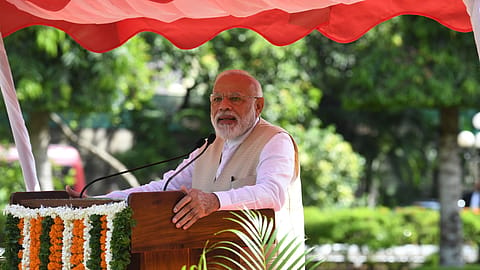Five environmental issues that the new government must address
As the Narendra Modi-led NDA government begins its second stint, here are the top five environmental problems it must tackle on a priority basis.

Farm distress, reviving GDP growth, boosting manufacturing, job creation, dealing with Pakistan – these are perhaps the first few things that come to one’s mind when asked about the key issues that the newly-elected government led by Prime Minister Narendra Modi must address immediately as they begin their second five-year stint at the helm.
However, there is a strong argument to be made that the issues requiring urgent attention are mostly environmental. Through the election season, headlines were dominated by sparring political party leaders, resulting in environmental issues having to take a backseat. With the polls behind us and the focus returning to climate change thanks to rising mercury levels, it is now the opportune moment to discuss the top five environmental issues that must be at the top of this government’s to-do list.
Air Quality
Some of the world’s most polluted cities are in India; the citizens of Delhi are already feeling the adverse impact of poor air quality. While the government’s electric mobility push is commendable, the need of the hour is charging stations, affordable batteries and incentives to shift from petrol/diesel to electric vehicles.
For industries, CEMS (Continuous emissions monitoring system) must be implemented. The proposed star rating system for industries to distinguish the better performing companies from the “can do better” ones must be implemented.
Water Conservation
All industries must be made ZLD (zero liquid discharge) units. While the law already requires it, implementation is the key. We need to stop the untreated effluents from entering our water bodies, only then would we be able to clean them.
Recommended Stories
A recent NITI Aayog report states that 21 Indian cities, including Delhi, Bengaluru and Hyderabad are likely to run out of ground water by 2020. We need to ensure through law and policy intervention that rainwater harvesting, and thus ground water recharge, is made mandatory.
PM Modi had set a deadline of March 2019 to complete 200 projects under the clean Ganga initiative, but the deadline has now been pushed to 2020. Here’s hoping that the new deadline will be honoured and more Indian rivers will be cleaned.
Waste Management
As the second most populated nation, it is no surprise that we generate massive amounts of waste – electronic, plastic, hazardous, construction and demolition, biomedical and most importantly solid waste. However, what is a surprise is the fact that we are still struggling to manage all this waste. Right from Swachh Bharat to Plastic Waste Management Rules of 2016, E-Waste (Management) Rules 2016 and Hazardous and Other Wastes (Management and Transboundary Movement) Rules, 2016 – the government has taken steps to address the issue, but as with several other initiatives, implementation is lacking. The banning of single use plastic was a step in the right direction, but we can see several such packaging products making a comeback.
(INR CR)
We are still relying on the unorganised sector to a great extent for our waste management. This needs to change and the necessary infrastructure needs to be created for efficient and effective waste management. Recycling plastic and other waste and reusing it in construction of roads etc must be incentivised.
Forests, Wildlife and Biodiversity
Forests are essential for our survival. We need to aggressively protect and improve our green cover. Any changes to existing protective laws and regulations such as the Indian Forest Act 1927, Environment Impact Assessment Notification 2006 along with a new National Forest Policy must not dilute the effectiveness of these protective laws.
The government must take a hard stance against erosion of biodiversity and closely regulate all activity to ensure that forests and wildlife aren’t endangered. The funds meant for compensatory afforestation must be utilised efficiently. The interests of the indigenous people and traditional forest dwellers must be protected.
Climate Change
PM Modi was recently awarded the UN’s Champions of the Earth Award along with the French President for championing the International Solar Alliance as well as for pledging to eliminate all single-use plastic in India by 2022. Clearly, India’s leadership is moving in the right direction. However, apart from the issues mentioned above, some of the other issues which were a part of India’s National Action Plan on Climate Change need urgent attention and this includes sustainable agriculture, protecting the Himalayan ecosystem and improving energy efficiency.
Very recently the government has come up with the extremely innovative initiative called the India Cooling Action Plan, which highlights our commitment as a nation to climate change adaptation and mitigation. This plan is aimed at reducing emissions and energy consumption along with making it cost-effective and eco-friendly. Innovations, entrepreneurship and skilled manpower in these areas must be encourage through incentives.
Views are personal.
The author is a partner at Khaitan & Co. He specialises in environmental dispute resolution and advisory. He is also a member of the IUCN World Commission on Environmental Law and the author of two books.